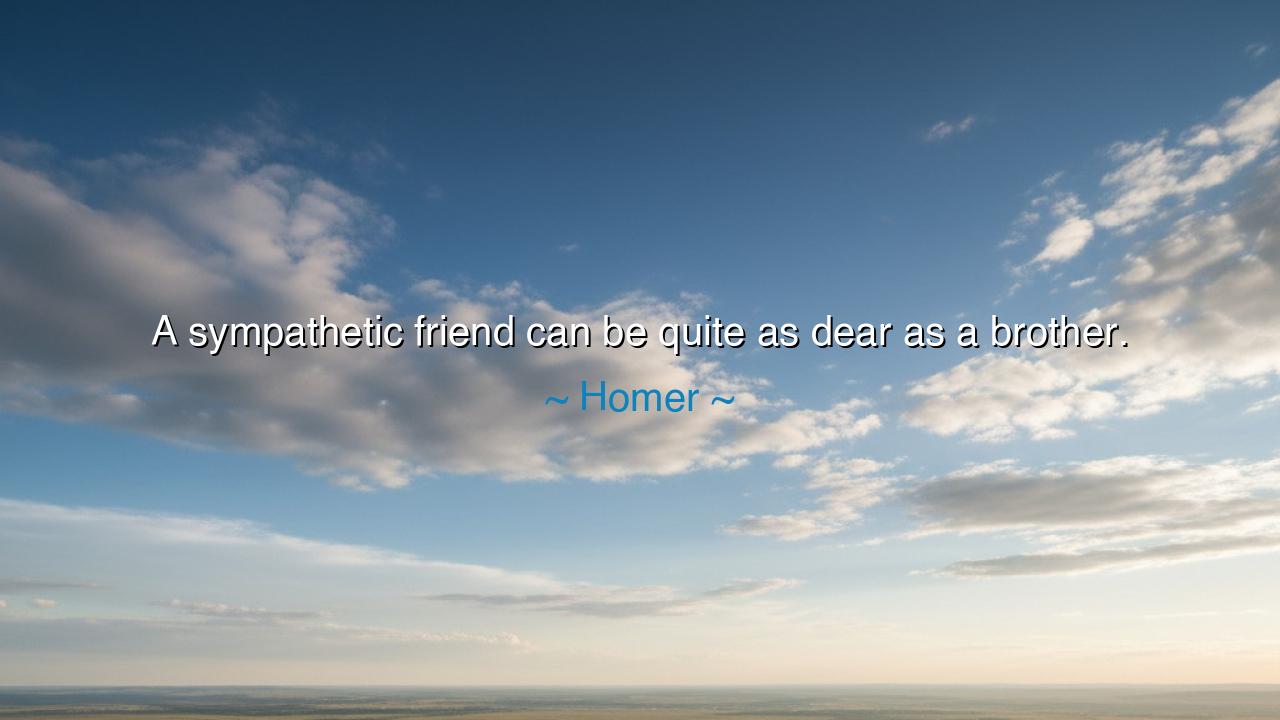
A sympathetic friend can be quite as dear as a brother.






"A sympathetic friend can be quite as dear as a brother." These timeless words from Homer, the poet of the great epic tales of Iliad and Odyssey, echo the profound truth that human relationships are not solely bound by blood, but by the depth of understanding and compassion that one offers to another. In his stories, Homer speaks not only of great battles and heroic deeds but of the bond between friends, a bond that, like that of siblings, can hold immense power and meaning. Here, Homer reminds us that sympathy, that powerful force of shared understanding and emotional connection, has the potential to create ties that transcend familial bonds.
In the ancient world, friendship was often seen as one of the highest forms of human connection. The Greeks revered the idea of philia—a deep, virtuous love between friends that was founded not just on mutual affection but on shared values, loyalties, and a commitment to each other’s well-being. Aristotle, in his Nicomachean Ethics, defined friendship as a union between individuals who seek the good of the other and who act with virtue toward one another. This friendship, he argued, could be even stronger and more meaningful than familial love, for it is based not merely on proximity but on mutual respect and compassion. In this sense, Homer’s words speak to the sacredness of a true, sympathetic friendship, one that can hold as much power and value as that of siblings or blood relatives.
Consider, for instance, the bond between Achilles and Patroclus in the Iliad. Their relationship is not defined by familial ties but by a deep sympathy for one another, a profound emotional connection that allows them to understand each other at the most intimate level. Their friendship is so powerful that it transcends even the love of family. When Patroclus dies on the battlefield, it is not merely a loss for Achilles as a friend but a loss that cuts to his very soul—the grief he experiences is as deep as the loss of a brother. This shows us that a sympathetic friend, someone who understands and shares our heart, can become a figure of such significance that their presence rivals that of our own flesh and blood.
In history, we also see examples of friendships that reflect the truth in Homer’s words. David and Jonathan, two figures from the Bible, exemplify a friendship that surpassed even the strongest of familial ties. Despite the fact that Jonathan was the son of King Saul, David’s greatest enemy, their friendship was marked by loyalty, mutual respect, and an unwavering emotional bond. Their deep connection, founded on sympathy and understanding, is one of the most famous in history, showing us that the affection and loyalty shared between friends can be as meaningful and powerful as that of brothers or even parents.
The wisdom of Homer calls us to reflect on the value of our friendships and the depth of our emotional connections. Too often, we place the strongest emphasis on family ties, considering them the most important in our lives. However, Homer’s quote invites us to recognize that true friends, those who stand beside us in times of sorrow and joy, are just as vital to our existence. Sympathetic friends, those who understand us without judgment, who offer support and encouragement in our darkest hours, have the power to be as cherished and as central to our well-being as our own family.
The lesson is simple: nurture your friendships with compassion, understanding, and empathy. A friend who listens, who truly understands your struggles, and who stands by you through trials, can be as dear to you as a brother. In our daily lives, let us not underestimate the value of a friend’s sympathy. Be the friend who offers this loyalty and care, and seek those who offer the same. By cultivating such relationships, we build bonds that can withstand the tests of time and hardship.
Let us remember that in this life, it is not only our family that will hold us up, but the sympathetic friend who stands by our side. Sympathy is a bridge that connects souls, transcending all divisions—be they blood or status—and it is through this deep connection that we find the most meaningful and enduring relationships. As Homer reminds us, a sympathetic friend, hand in hand with us through the journey of life, is truly as dear as a brother, for in the deepest friendships, we find a reflection of the greatest human virtue—our capacity for love, understanding, and support.






AAdministratorAdministrator
Welcome, honored guests. Please leave a comment, we will respond soon